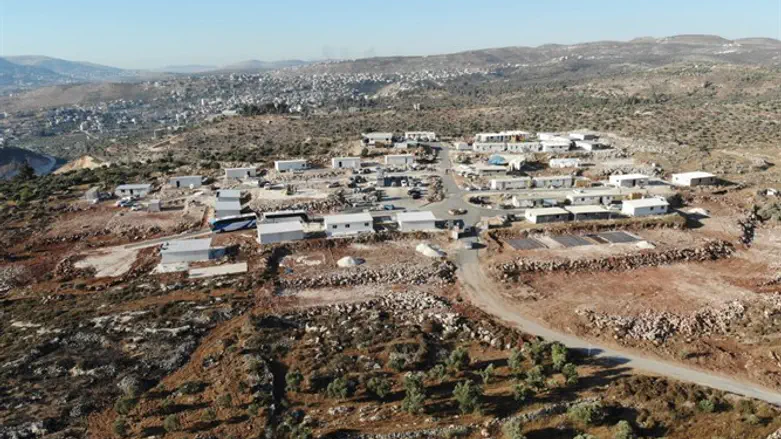
The IDF is reportedly determined to go through with the evacuation of the settlement of Evyatar, after rejecting a construction plan filed by its residents.
In its response to the request, the IDF Central Command stated that Evyatar’s residents “violated the law in a blatant and grave manner, and this is conduct that can in no way be condoned.”
The IDF’s response also noted that what they call “Givat Evyatar” was established illegally and that everything done there was done expressly against the law without any procedures put in place to establish ownership or regulate construction. The Central Command also claimed that, “The establishment of this illegal settlement contributed to the undermining of a stable security situation in the region.”
With regard to the master plan submitted by the Samaria Regional Council last Thursday, the ombudsman for Judea and Samaria determined that the plan was not properly developed and that the settlers have no rights to the land concerned. His conclusion was, therefore, that the filing of a construction plan for land to which the petitioners have no right does not constitute an impediment to the initiation of procedures to enforce the law against the settlement.
The IDF also noted that its forces have already been diverted from other significant activities in order to secure the settlement, which impedes its ability to defend the security of the entire region.
What this means in practice is that the only route left open to the 50 families living in Evyatar is to appeal to the Supreme Court, and it is likely that they will do so.
Zvi Sukkot, one of the leaders of the settlement, attacked the Central Command’s ruling, saying, “Any regional instability created by the existence of Evyatar is no different from that created by any other Jewish presence in the Land of Israel, for the past 100 years. They didn’t accept our presence then and to this day they do not accept our presence anywhere. To drive Jews out of their homes because of Arab riots can only be called surrender to terrorism. They should be ashamed of themselves.”
Last week, the Samaria Regional Council, in an attempt to avert the evacuation of Evyatar, submitted a master construction plan for the town asking that it be authorized and the town thereby granted legal status. The plans included the building of 100 housing units on an area of around 95 dunams, as well as land for communal purposes on another approximately 2.5 dunams – including plans to construct a synagogue, a community center, day care centers, preschools. Another nine dunams were set aside for public parks. The plans were presented as the expansion of the existing settlement of Kfar Tapuah.
The residents’ hope that submitting a request to authorize construction would lead to plans to evacuate the town being halted was not without basis, as the Civil Administration’s regulations include a clause that states: “As long as applications for construction permits are being considered … procedures toward enforcement [including evacuation] are frozen.”
At the end of the day, approval for Evyatar’s construction plans would involve the making of a specific policy decision by central government. The head of the Samaria Regional Council, Yossi Dagan, noted that, “The Council only submitted a request to authorize construction for the town of Evyatar after establishing beyond doubt that it is not situated on privately held land. Rather, it is situated on state-held land, and only the lack of a clear decision on the part of politicians is preventing its authorization. After going through such a difficult period, the State of Israel should be mobilizing all its forces to take this step, which would be both moral and ethical – it should be strengthening the 50 families who live here and giving Evyatar equal legal status to any other town in the country.”
The town of Evyatar was first founded eight years ago, named for Evyatar Borovsky, who was murdered by Arab terrorists at the nearby Tapuah Junction. Construction was recently renewed at the site following the murder of Yehuda Guetta in a shooting attack, also at the Tapuah Junction. Around 50 families already live there, and another approximately 70 families are on its waiting list.